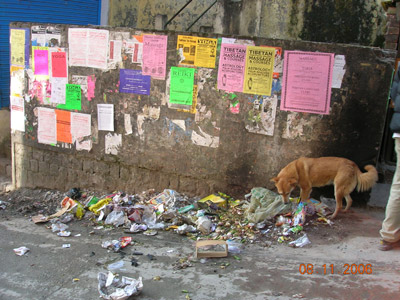Some time has now passed since I first heard the news of Israel’s bombing of Lebanon. Apart from newspapers and the internet, it seems to have passed by almost unnoticed here in McLeod Ganj where local people are struggling with their everyday lives; Tibetans with their political activism and spiritual journeys and Indians mostly in employment and survival.
I came to India to learn about non-violence. I figured here, in the land of Gandhi’s struggles, there would still be some kind of spirit left in the practice of non-violence. I have now learned that violence is not only related to the physical acts of violence we can see around us; it actually starts deep inside every individual. All our acts are the result of what is happening inside of us. If we feel anxiety or anger in any way it will be reflected in our actions and impacts on our families, community and environment. I found that Buddhism approaches our human negativity in a very positive way with solutions for many differents aspects of life. For example it deals mainly with the issue of suffering within every person and how to eliminate it. We can overcome suffering through the practice of compassion towards every living being.
Within Tibetan Medical Philosophy there are three mental poisons: Attachment, Hatred and Delusion. These are linked with the bodily elements of fire, water, air and earth and when they are unbalanced disease and disharmony appears. It is in these poisons that, I think, we can find the root of many of the problems that afflict us today.
Every day we struggle with violence, coming from within us or outside. We disconnect ourselves from our Self in our daily struggles for money, material things and love, and we often blindly cling on to these for fear of losing them. This is where the Buddhist philosophy of non-attachment offers a different perspective of reality, since our desires for things only can bring greed and suffering to ourselves and others if we do not control them. Gandhi rightly put it when he said that ‘The world has enough for everybody´s need, but not for everybody´s greed’.
So, what is the best approach to non-violence in our daily lives? “To think: you are my friend”, is the simple answer I get from a Gandhian activist of India today. We should try, first of all, to understand ourselves. This should make us more aware and act more responsibily, aware of the consequences of our actions. If we could go so far as to embrace our enemies, that would be a huge step forward in creating peace. Non-violence, he says, can be divided into four levels; non-violence on a personal level, non- violence within the family, non-violence nationally and non-violence on an international level. Non-violent methods should be relevant to the political and cultural contexts in which conflicts arise.
While the UN is debating whether or not to send more Observers to Lebanon four Observers have been killed by an Israeli bomb. Hizbollah and most EU countries are pushing for a ceasefire and peace agreement, though some think this is not the appropriate time for it and that ‘terror’ should be ‘punished’ first before a ceasefire agreement. Meanwhile I think of my Lebanese friends who have left their families members behind at home. Frustrated over my individual inability to affect this situation, I turn to my book, trying to look into the deep well of Buddhist philosophy which seems to give some comfort and hope and gives solutions for seeing things in a more positive way. But I have found no answers or suggestions for such international issues, only answers on the individual level and this way seems to be long and disciplined. I only see one answer; to unlearn in order to learn again, for the vicious spiral of violence in this conflict seems to have no other solution. We have become blindly caught in continuing spirals of violence and without new approaches and methods we will have no way out.
During converstaions with my refugee friends from the Middle East, I was overwhelmed by their feelings of despair and in some of them the strong desire for revenge even though they may have settled in a new society often unlike their own, some going regularily to hospital for treatment for trauma. In marked contrast here in Dharamasala I am met only by smiles of refugees, who have also gone through a lot of violent experiences before taking refuge in India. For them the Dalai Lama is a highly respected spiritual and political leader, and is a source of inspiration and hope. Every refugee that arrives gets to meet him in person. I am amazed by the ease and sense of humor they approach life and I ask myself the reason why theyare so different. Is it because they don’t have any weapons to fight for the freedom of their country, or is it to be found in Buddhist philosophy and way of life where compassion is an essential and crucial way of life? The only way we can solve conflict is to use non-violence. Buddhism can teach us these methods of conflict-resolution.




 Print
Print Email
Email